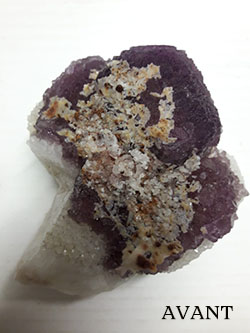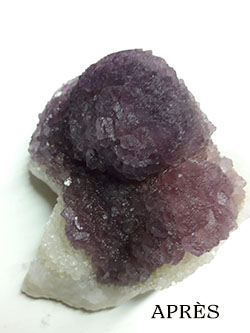How to maintain and clean your minerals.
Know Your Mineral
Before starting, it is crucial to know the specific property of your mineral. Some stones are delicate and require gentle cleaning, while others can withstand more robust cleaning methods. Therefore, inform yourself about the characteristics of each stone beforehand to avoid damaging their shine.
Standard Cleaning Method
Generally, the most common cleaning method involves using lukewarm water and mild soap. Soak your stone or mineral in soapy water and then gently rub with a soft-bristled brush to remove dirt and impurities that have deposited. Rinse thoroughly with clean water (see distilled water) and dry carefully with a soft cloth.
Avoid chemicals that, without specific knowledge, can be aggressive and damage minerals and alter their natural shine. This method is reserved for knowledgeable collectors and prospectors who collect their stones themselves and wish to enhance the crystals. This is not the subject of this article since the minerals for sale on our site are free of all impurities, often being part of old collections.
Precautions for Sensitive Minerals
For stones and minerals with crevices or hard-to-reach fissures, use a soft-bristled toothbrush dipped in soapy water. This will help remove dirt trapped in these areas without damaging them.
Some stones and minerals can be sensitive to direct sunlight, like amethyst or some fluorites, and to moisture like calcite, pyrite, or malachite. Avoid exposing them to these elements for extended periods, as this could alter their color and shine. Display them or store them in a dry place, away from the light.
Most often, a soft microfiber cloth passed regularly to remove dust will suffice to maintain their natural shine.
Caution with Soluble Minerals
Note, however, that some minerals are soluble in water, and this method should not apply to them. For example:
- Halite (Rock Salt): Probably the most well-known soluble mineral, composed mainly of sodium chloride (NaCl).
- Sylvite: A mineral composed of potassium chloride (KCl), often associated with halite in evaporite deposits.
- Nitre (Saltpeter): Potassium nitrate (KNO3), historically used in gunpowder manufacturing.
- Thenardite: Sodium sulfate (Na2SO4), which can transform into mirabilite when hydrated.
- Mirabilite (Glauber's Salt): Decahydrate of sodium sulfate (Na2SO4·10H2O), forming from thenardite when it absorbs moisture.
- Trona: An evaporite mineral composed of hydrated sodium carbonate and sodium bicarbonate.
- Epsomite (Epsom Salt): Magnesium sulfate heptahydrate (MgSO4·7H2O), known for its use in baths to relieve muscle pain.
- Borax: Sodium tetraborate decahydrate (Na2B4O7·10H2O), used in glass manufacturing and as a cleaning agent.
- Glaucocerite: Hydrated potassium and magnesium sulfate, often found with other soluble minerals in evaporite deposits.
Examples of cleaned stones:


Fluorine treated with phosphoric acid and pressure gun.
